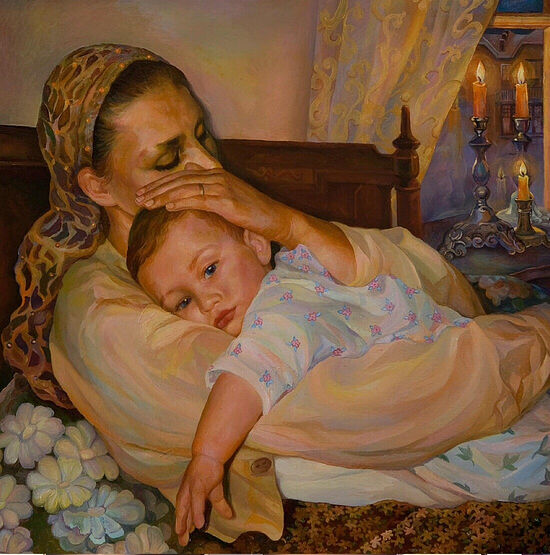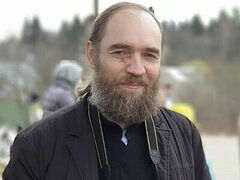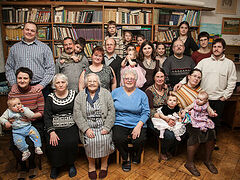Today, many people talk about strengthening family values and traditional families. Without respect for mothers and their work at home, this task is probably impossible. We talked to Anna Mustafina—the psychologist, OB-GYN doctor, member of the “Doctors for Life” public organization—and asked her why mother’s work is undervalued in modern society, why mothers who put aside their careers and scientific degrees for the sake of raising children are embarrassed about it, why the word “housewife” carries a negative connotation, and how we can rectify this situation.
Should we learn to be a mom?
For twenty years, I nurtured the idea of founding the University of Wife and Mother.
Today, many people consider it imperative to have a higher education. Sometimes people go to study in the university not because they are called to work in a certain field, but because it’s how it should be. After graduation, many people do not find the core of employment according to their knowledge and skills and find employment in a different field. If we had a university of professional training, such as the University of Wife and Mother, it would be a great undertaking; such knowledge will always be useful.
I am by no means against our young women receiving a diploma at our “regular” universities. But practice shows that not everyone works in their area of study. This university would have helped them to become a professional mom and build a family.
We underestimate the range of work a mother does
We are obliged to include mother’s work as a professions, because we underestimate the range of work a mother performs. Modern society underestimates her intellectual investment in a child, and we are all aware of the physical challenges of caring for an infant. What we don’t know, or we fail to realize, is the volume of intellectual and emotional effort and psychological knowledge necessary to properly interact with the child without causing psychological trauma, how to bring up a child without restrictions, but to on the contrary facilitate his upbringing. This is why we need such a university.
Working through psychological problems
The idea of creating the University of Motherhood is as follows.
During the first year of education, this university should allow its students to work through their own childhood stories and make them sift through their own psychological issues. Some had more or less happy childhoods, while others had problems, such as alcoholic parents, or they had a single-parent family, brought up only by a mother, or a father. There are always some defects—even if it was a complete family, with a loving and friendly mom and dad, with no bad habits, the parents may have made mistakes due to their lack of psychological knowledge. For example, they suppressed their child’s emotions or forbade him to have fun, as in, “Don’t run, don’t jump, don’t laugh!” or to experience grief, as in, “Don’t cry”, or when the boys were told the mantra, “You can’t be a man if you cry,” or the girls were told, “Stop crying, you cry baby.” Others forbid their children to express anger and so on. Because of this psychological ignorance, people experience difficulties in adult life. The whole first course should be dedicated to such issues.
Because of psychological ignorance, people have difficulties in adult life
The second course would be about choosing a life partner. We have only a few examples of families worthy of imitation. We have a lot of incomplete families and a huge number of divorces. There are complete families with both mother and father, but their relationship is far from perfect. It often happens that the head of the family is a despot, a cruel man who subjects his family to psychological and physical abuse. Mothers can be despotic or hyper-protective, controlling everything and everyone. Or vice versa—they can be cold, emotionally inaccessible, and detached from their own children. There are many different options here and all this affects familial bonds and the ability of a woman to build a stable family.
To get married is not about mothering your life partner
Working through all of these things in depth will help us to become a person of integrity. Imagine when a young adult begins to process all these issues right after school, and by the age of seventeen or eighteen makes corrections to her inner self. This way, she will never attract an abuser, a weakling, or an addict to herself.
This is a big problem right now—when a woman has low self-esteem, she can allow someone to take advantage of her, act as an “adopted parent” to a man, including those with addictions like alcoholism or gambling. Often young women choose a man as a life partner as if they were selecting a kitten; but can a kitten become a full-fledged head of the family and a father?
Young men can also study in such institutions, but these institutions, of course, will have different names. This subject is already being discussed as well.
Considering our psychological illiteracy, not only girls, but also young men need to go through this process of correcting the mistakes of their upbringing.
Illusion of equality
The next course is ethics and psychology of family life. This is already about family roles and specifics of development, depending on gender. There is an illusion that men and women are created equal. But simply touching their bodies—just ask any masseuse—would be enough to realize that women’s and men’s bodies are different even to the touch. So different that you can’t compare them.
There are also differences in the psyche. Men have a more vulnerable psyche than women. Just as a woman’s body is more vulnerable than a man’s, our stronger half’s psyche is more vulnerable.
The difference is in male and female behavior and their abilities. These are not words, these are medical facts.
Even at the fetal age of six weeks, boys develop testicles and girls have ovaries, and these organs begin to function and secrete hormones, each according to their sex. Organ rudiments in girls and boys are the same, but due to the action of sex hormones, these rudiments become female or male organs. Hormones are responsible for sex differentiation of brain structure. Women are not very aware of their body exterior or the dimensions of their car. It is not so easy for them to estimate the distance and the size of something by eye. Therefore, the ability to navigate in space is more developed in men.
There are many differences in psyche and behavior depending on gender. For example, boys see moving objects better and fail to notice static ones. Women get unreasonably angry with their husbands, alleging that they look but can’t see. Then, there is the ability to perceive colors. Women have a wider range of color perception, and it is quite rare to find in men the ability to distinguish hues. When a wife says, bring a soft pink towel, her husband may bring a white or a beige one.
The maternal instinct can’t emerge on its own
The next course is the psychology of parenthood.
There is no such thing as maternal instinct. It develops, beginning in utero thanks to the mother’s attitude toward her child
Perinatal psychologists have studied ontogenesis. It turns out that there is no such thing as maternal instinct. It develops at the intrauterine age thanks to the attitude the mother has towards her child. There are several ways to live through pregnancy: normal, anxious, rejecting, euphoric, ignoring, or ambivalent.
The way a pregnancy goes will affect the child and his future desire to have children. Infant care is also of great importance—whether the mother stays with her baby postpartum or asks to pick him up. Some women think that perhaps a nurse can take the newborn for the night or for a few hours in the afternoon, so I can rest away from him during this time. So, the first separation moments may last several hours. The infant is with his mother as a fetus from conception. He needs time to adjust to his separation from his mother for longer periods. Overall, parenthood is a process of gradual separation (dissociation) of a child from his family of origin. The key word here is “gradual.” Then this process will go painlessly. Childbirth is the first stage of separation. A baby “leaps out” into another world. It is so totally different from the pre-natal world that it takes time to “digest” it and live through this event. So, a newborn can only stay without his mom for two hours to avoid subsequent psychological trauma. An infant can’t be separated from his mother for more than two hours, if we want to preserve his mental health.
The next thing that affects the ontogenesis of motherhood (as well as fatherhood) is the mother’s sensitivity to her baby’s needs; to what extent the mother has developed sensory capabilities, that is, the ability to understand another person without words.
In the past, this ability to feel her baby was passed on from mother to daughter or son, and so on, one by one. But because the maternity hospital practice is to take newborns away at once, separating the infants from their mothers, feeding them by the hour, and giving them formula instead of breast milk, the ontogenesis of parenthood has been disrupted.
A separate matter is day care centers and nurseries. Sending your baby away to a kindergarten, placing them in a group of twenty-five or thirty babies under the supervision of one or two women? Even if your childcare workers are super-professional, responsible and caring, they won’t ever be able to fully care for the infants and provide them with everything they need! Day care is a storage room for babies! A boarding house! It is not in vain that Archpriest Dimitry Smirnov spoke negatively about day care centers.
A woman as a partner or a coworker?
While on maternity leave, moms think of themselves as second-rate people. It is astonishing, but this kind of mental virus took our country captive as early as at the beginning of the twentieth century. We were forced into believing that it is a shame to be a housewife; that all women should work at factories and only when they work at a factory, can they be considered real Women. I watched one more time an old Soviet movie called, “A Visitor from the Kuban.” It showed a “goodie” character of a girl who works, but also can sing and dance. She is an outstanding worker and a great colleague; she excels at everything she does. But what the movie lacked was the character of a mother, a father, and a family man. It doesn’t matter how well you understand your wife, how well you can listen or sympathize as a wife, or how you bring up your children. This fact was simply ignored! The movies of that era showcased everyone as good and honest workers who made friends at work and fell in love, started families, but what happened in that family afterwards was omitted. For example, these movies don’t show a mother with four children. Or the situation when a father comes home from work, greeted by his children, and he talks and plays with them. They didn’t showcase family life.
Remember the posters of that time—they had a mom, dad and a child, or two at most? This “ideal family plan” is firmly lodged in everyone’s mind. Even mothers with many children felt as if ashamed of their status, as if they had done something antisocial.
The word “housewife” is probably the worst word that can be applied to a woman
I feel bad for moms, who sink their heads into their shoulders and look downwards. And these are not necessarily mothers with many children.
I was once standing in a line with a friend of mine, a mother of two children, when someone asked her, “How is it? Still home with your kid?” She quietly justified herself: “Yes, I'm still on maternity leave.” I spoke up: “But she can barely sit down during the day, maybe for a second, enough to grab something to eat—and it’s because she educates her children, brings them up, and stays busy taking care of her household!”
In many countries, the word “housewife” is probably the worst word that can be applied to women.
Every worker or a manager deserves respect and admiration for his work, but when a woman is at home caring for her child, she is just a backward housewife. Apparently, this virus sank too deep as it got stuck in our heads for more than a hundred years. It’s time to do something about it.
A pilot mom, so what of it? How about restoring respect for maternal labor?
Psychology has a special branch called psychology of professions. It has determined which occupation is the most difficult. The research used such radical professions as miners, polar explorers, astronauts, and sailors. It was discovered that the hardest labor is that of mothers. Increased responsibility, noise load, but most importantly—no days off, no paid vacation, or holidays. Besides, there is no shift-relief worker who would come and replace her for a few hours. This is an official recognition of a mother’s work as the hardest and the most important.
Maternal labor is much more valuable than the work of any researcher, geologist, volcanologist, oil producer, or others, because all these people were born and brought up by a woman.
The most successful man in the world, be he a president, astronaut, billionaire, or a doctor, won’t be able to give birth to a child.
All men of genius, pathfinders, and military leaders had mothers who delivered, loved, and took care of them. Out of love for their children, they made sacrifices—never getting enough sleep, missing meals, and working around-the-clock without lunch breaks or vacation time. A mother’s work is worthy of respect.
Once we finally recognize the value of motherhood and do it justice, then let this notion sink into our minds, then we will be able to shift our demographic situation for the better. Then we, women, will be able to get rid of our viral code: that a housewife is something unimportant, of no value, and we are to return to work as soon as possible. When this happens, we will become pro-life people and stop having abortions.
That unhealthy attitude continues to be profitable because women are needed in production and inside offices. At home, a woman is a law unto herself.





